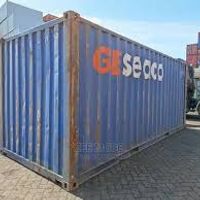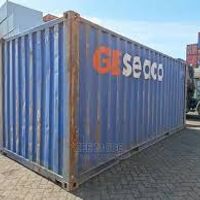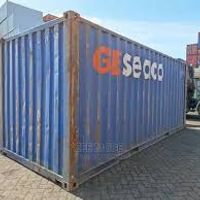A shipping container self-storage business is profitable with lower upfront costs and minimal ongoing expenses. In this blog, we’ll run you through a step-by-step guide on how to launch your venture and minimize your container sourcing costs.
With one in five Americans renting self-storage space, the demand for affordable and flexible storage solutions has never been higher. Shipping container self-storage is an innovative way to enter this expanding market, offering a scalable and cost-effective business model.
What’s more, with our container trading marketplace, you can bypass middlemen and secure shipping containers at negotiable and wholesale prices. Save money on sourcing costs and strike the best deals for your business hassle-free!
Check out the storage containers we have available right now in your location by using the search tool below!
10,453 results found on the platform.
Container prices start from $200/unit.
Currently no match for your search
Change your search criteria or fill out the form below to get notified via email when there is a new match for you on xChange!
-
Pick-up
40HC (Cargo worthy)
4 units available
YOM:
Year of manufacture:
2004
2010
Los Angeles, CA
per container
Non-negotiable price$
1650
-
Pick-up
20DC (Cargo worthy)
40 units available
YOM:
Year of manufacture:
2004
2010
Savannah, GA
per container
Non-negotiable price$
925
-
Pick-up
40HC (Cargo worthy)
9 units available
YOM:
Year of manufacture:
2004
2010
Chicago, IL
per container
Non-negotiable price$
1700
Showing 3 of 10,453 results
Load more()
YOM:
Year of manufacture:
per container
$
Introduction to container self-storage as a business
As cities expand and population grows, the demand for self-storage has been continuously growing. There’s never been a better time to venture into this industry with cost-effective storage solutions. And this is why repurposed shipping container self-storage facilities are gaining popularity among entrepreneurs and investors for their flexibility, lower startup costs, and environmental benefits.
Shipping containers are incredibly durable, easy to acquire, and quick to set up, making them ideal for self-storage. Additionally, they are portable so you can even venture into portable storage solutions or relocate as per your need.
Why start a shipping container self-storage business?
As mentioned above, self-storage is in high demand in the United States. More than 20% of Americans use some form of self-storage, making this an in-demand service. People will pay good money to rent a space, especially if they know their possessions are safe and easy to access when they need them. Here are a few more great reasons to get your businesses started:
Benefits of using shipping containers
Cost-effectiveness: Containers are more affordable than traditional storage units, and they can often be sourced in bulk, further reducing costs.
Scalability: With a shipping container storage business, scalability is quick and easy, as units are portable and easy to transport via trucks, trains and ships. Wanting to expand to a larger site? No problem, simply set up the new site and move your units over.
Eco-friendly: Using already existing containers, rather than building storage units from scratch is not only cost effective, but also better for the environment. Here, you’re repurposing equipment that may otherwise just sit around gathering dust, or end up in a dump. Plus, you’re avoiding using valuable resources to create entire new structures.
Low maintenance: Self-storage facilities aren’t as demanding as other types of businesses in terms of day-to-day management. Once the business is set up, you’ll only need a few security workers, ground staff and front-of-house staff on-site to run things smoothly.
How much will it cost to start a container self-storage business?
Just like any other business, starting a shipping container self-storage business requires upfront costs, but they are typically much lower than those of traditional facilities.
Cost Breakdown
Containers: A new 40 foot storage container can cost around $2,000, while used containers are available for $1,200–$1,800. For a facility with 50 containers, expect to spend between $60,000–$100,000 on containers alone.
For 40ft cargo-worthy containers in the US on our platform, you’re looking at an average price of US $1,680. To know the current container cost of other container sizes and types, check new and used container prices in 2,500+ locations now.
Land and Site Preparation: Depending on the location, land can cost between $16,000-$20,000 per acre. Site preparation (grading, fencing, security, etc.) can add another $15,000.
Permits and Licenses: Expect to pay for local permits, business licenses, and potentially zoning changes, which can range from $5,000–$10,000.
Financing Options
There are several financing options to help you start your business, including:
Small Business Loans: Check with banks or SBA for startup loans specific to storage businesses.
Investor Partnerships: Find investors who are interested in the self-storage industry and willing to fund part of the startup costs in exchange for equity.
Personal Savings: Many entrepreneurs fund part or all of the startup costs using personal savings.
Step-by-step guide to starting a container self-storage business
If you’re not sure where to begin, here are the most important steps to getting your business started.
Step 1: Conduct market research
Analyze your local market to assess demand for storage. Identify potential competitors, analyze their offerings, and determine the target customer base in your area. Look for factors such as:
- Population density: Storage facilities thrive in areas with high population density.
- Local Traffic: Choose a site near main roads or highways for easy access and visibility.
- Competitor analysis: Understand what your competitors are doing and find ways to differentiate your business.
Step 2: Create a business plan
Next, create your business plan. This should include the following sections:
- Business description: Outline all the services your container self-storage business will provide.
- Market analysis: Describe your target audience, competitors, and your unique selling proposition.
- Marketing strategy: Your marketing strategy should detail how you’re going to reach your target audience, to convince them to use your service offerings.
- Pricing Strategy: Determine rental rates based on market averages and profitability goals.
- Operations plan: Explain exactly how your business is going to run. This should include how many staff you’ll need, what kinds of processes you’ll implement, etc
- Financial projections: Include your budget plus all financial requirements for starting and running your business.
Step 3: Choose the location and secure correct permits
Select a location with good accessibility, high visibility, and sufficient space for container placement. Once that’s done, you’ll need to secure the correct permissions in order to operate a self storage business in your chosen location.
This may include getting building permits that abide by shipping container zoning laws, business licenses, and environmental permits.
Step 4: Prepare the site
To prepare your site for use as a self storage facility, you may need to clear and flatten the land, put up fencing, security and lighting, as well as set up an office and reception area. You’ll also need to create a layout for containers to be placed on the site.
Step 5: Source and prepare shipping containers
While preparing your site, start sourcing shipping containers for your facility. It’s best to buy high-quality wholesale shipping containers and our container marketplace can help you with this.
On our container trading marketplace, you’ll get instant access to multiple container offers in one dashboard. Simply browse and compare the wholesale container offers and shortlist a few. Then, negotiate directly with the suppliers on the marketplace to secure an offer that fits your budget.
We facilitate safe payments and charge no commission on containers. Learn how storage companies are already saving money with our container marketplace.
Step 6: Prepare your containers for storage use
If you’re choosing old shipping containers for sale, some of them may need repairs. This could include patching up holes, removing dents and scratches, and repainting interior and exterior walls.
Make all of your containers look uniform by painting them the same color. Ensure to use a chemical and corrosion-resistant paint to protect your units.
Step 7: Develop a marketing and customer acquisition strategy
To attract customers, you’ll need a solid marketing plan:
- Website and SEO: Create a professional website optimized for local searches. Most customers will find you online, so invest in a mobile-friendly, easy-to-navigate site.
- Local advertising: Use targeted ads on social media, and consider partnering with local businesses to promote your facility.
- Signage: Ensure that you have clear signage on and around the site to increase visibility.
How much money can you make with self storage facilities
Shipping container self-storage businesses can yield significant revenue due to relatively low overhead costs and steady demand. Rental rates for containers typically range from $100 to $250 per month.
If you charge an average rate of $180 per container and maintain an 85% occupancy rate with 50 containers, you could generate approximately $7,740 per month, or $92,880 annually.
With startup costs estimated between $96,000 and $145,000, you could reach the break-even point in about 1.5 years. After this, the business would generate consistent profits, as operational costs are relatively low.
One way to reduce your costs is by saving on container brokerage fees with our container marketplace. Here, you’ll deal directly with suppliers, cutting out the middleman and avoiding inflated prices for containers.
Speak to one of our experts about how to get the best deals on our platform.
Tips for running a successful container storage facility
Choose your site carefully: It’s essential that you select a location that’s easily accessible for customers, as well as for shipping container trucks for delivering or moving your units. If your site is difficult to reach, you may lose out on clientele or have problems getting containers into and out of the location.
Protect yourself from scammers and online fraud: There are a lot of scam artists out there hoping to trick buyers into paying for poor quality containers or not delivering units that have been paid for. Not to mention overcharging for containers.
To avoid these shipping container scams, it’s best to use a platform like our container marketplace, where all the suppliers and buyers have been vetted and pre-approved already. Less work for you, and more peace of mind.
Select comprehensive insurance: Make sure you get comprehensive cover for all of your business assets, as well as for stored goods. This will protect you from unforeseen circumstances. You could also offer insurance options to your customers, as a supplementary product.
Buy containers for self-storage at wholesale prices on xChange
Having a secure online marketplace for all of your shipping container needs means one less thing on your list when starting your self-storage business. Once you subscribe to our platform, you’ll get:
An inventory of 100,000+ containers in 2,500+ cities globally: On our platform, you can find shipping containers to buy in over 2,500 cities around the world. So you’ll have no problem sourcing the units you need, no matter where you are.
A network of 1,700+ pre-approved partners: With xChange, you gain direct access to container suppliers and wholesalers globally. Increase your network of suppliers and diversify your container sourcing channels.
Secure online payments: We mediate payments to enable safe transactions and you get a 7-day quality assurance period and money-back guarantee in case there’s a problem with the containers you’ve purchased.
With xChange, start your shipping container self storage business with the confidence that you’re getting the best wholesale prices on containers, from reliable suppliers every time you source units.
Click below to set up your demo with our expert team now to learn more about how you can save money and buy containers at competitive prices today.
Common FAQs: Shipping container self storage
Can you store things in a shipping container?
Shipping containers are perfect for residential or commercial storage use due to their strong, durable, and wind and watertight design. Shipping containers are built to withstand extreme weather conditions including floods and fires, keeping inventory and possessions safe and secure.
What can you store in a 20ft shipping container?
A 20ft shipping container can be used to store the contents of a small 2-3 bedroom house, around 50-60 fridges, 400 flat screen TVs or 10 pallets (carrying 60 boxes each). 20ft dry containers are built to keep wind, water and harsh weather out, keeping stored items dry and protected all year round.
What is shipping container self-storage?
Shipping container self storage is a facility that uses shipping containers as storage units for individuals and businesses to rent out. Shipping containers provide a strong, waterproof and durable storage space, keeping inventory or personal possessions safe and secure throughout the year.










